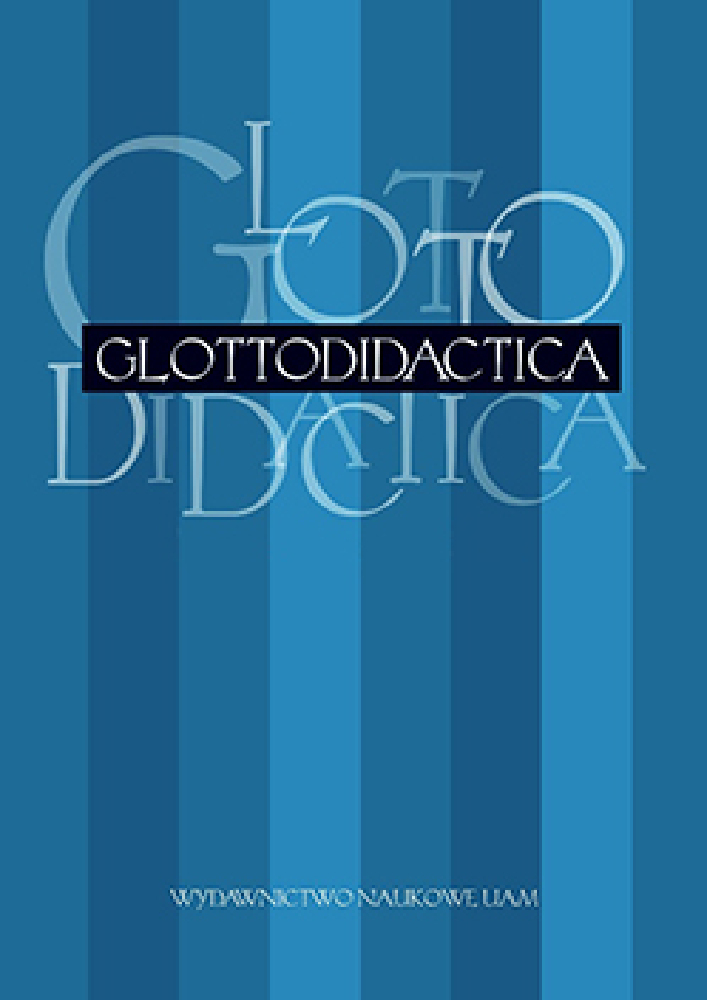Abstract
This paper attempts to answer the question about the scope of reflection in foreign language teaching. The starting point is the assumption that through reflection on language and its use one can support language learning processes. The above considerations apply to the learner's perspective and they relate to process of fostering the development of language awareness and cultural awareness. Additionally, the article contains a list of instruments whose function is to facilitate student reflection in the process of developing learning awareness. At the end selected factors determining the scope of reflection in learning a foreign language are indicated.
References
Bilut-Homplewicz, Z. 2005. Zur Sprachnorm-Auffassung im muttersprachlichen und fremdsprachlichen Kontext. In: Stanulewicz, D. / Kalisz, R. / Klaus., C. (Hrsg.). De lingua et litteris: Studia in honorem Casimiri Andreae Sroka. Gdańsk: Wydawnictwo Uniwersytetu Gdańskiego, 45-51.
Bohl, T. 2001. Prüfen und Bewerten im Offenen Unterricht. Neuwied: Luchterhand.
Bredella, L. 2004. Die Bedeutung multikultureller narrativer Texte für die Anerkennung der Mehrsprachigkeit und Mehrkulturalität. In: Bausch K.-R. / Königs, F. /Krumm H.-J. (Hrsg.). Mehrsprachigkeit im Fokus. Tübingen: Narr, 16-21.
Chan, W.M. 2000. Metakognition und der DaF- Unterricht für asiatische Lerner. Münster u.a. Waxmann.
Chudak, S. 2013. Eigenkulturelle Reflexion im Fremdsprachenunterricht. Zur Stellung und zu den Möglichkeiten der Bewusstmachung eigenkultureller Prägungen der Fremdsprachenlernenden im Kontext der Förderung ihrer interkulturellen Kompetenz. In: Studia Germanica Posnaniensia, 33, 13-28.
Flavell, J.H. 1979. Metacognition and cognitive monitoring. In: American Psychologist, 34, 906-911.
Gnutzmann, C. 1997. Language Awareness. Geschichte, Grundlagen, Anwendung. In: Praxis des neusprachlichen Unterrichts, 3, 227-236.
House, J. 1994. Kontrastive Pragmatik und interkulturelles Lernen: vom metapragmatischem Wissen zu kommunikativem Handeln. In: Bausch, K.-R. / Christ, H. / Krumm H.-J. (Hrsg.). Interkulturelles Lernen im Fremdsprachenunterricht. Tübingen: Narr, 85-93.
House, J. 1997. Kommunikative Bewußtheit und Fremdsprachenlernen. In: Fremdsprachen Lehren und Lernen, 26, 68-87.
Kleppin, K. 2005. Selbstreflexion und Selbstevaluation: ein vernachlässigtes Potenzial bei Aufgaben. In: Bausch, K.-R. u.a. (Hrsg.). Aufgabenorientierung als Aufgabe. Tübingen: Narr, 102-108.
Knapp-Potthoff, A. 1997. Sprach(lern)bewußtheit im Kontext. In: Fremdsprachen Lehren und Lernen, 26, 9-23.
Krumm, H.-J. 1994. Interkulturelles Lernen im Fremdsprachenunterricht. In: Bausch, K. R. / Christ, H. / Krumm (Hrsg.). Interkulturelles Lernen im Fremdsprachenunterricht, 117-127.
Myczko, K. 2013. Die Förderung des Sprachbewusstheit im Fremdsprachenunterricht. In: Błachut, E. / Jarosz, J. / Małgorzewicz, A./Opiłowski, R. (Hrsg.). Sprachwissenschaft im Fokus germanistischer Forschung und Lehre. Wrocław-Dresden: Neisse Verlag, 331-338.
Myczko, K. 2013. Konstrukty świadomości komunikacyjnej w kształceniu obcojęzycznym. In: Lingwistyka Stosowana, 8, 93-102.
Myczko, K. 2012. Zu den Instrumenten und Verfahren bei der Förderung der Selbstevaluation im Fremdsprachenunterricht. In: Olpińska-Szkiełko, M. / Grucza, S. / Berdychowska Z. / Żmudzki J.(Hrsg.). Der Mensch und seine Sprachen. Festschrift für Professor Franciszek Grucza. Frankfurt am Main u.a.: Peter Lang, 436-444.
Nerlicki, K. 2011. Lernerreflexionen im Blickpunkt. Polnische Germanistikstudenten über ihre fremdsprachlichen Lern- und Kommunikationerfahrungen. Hamburg: Kovač.
Pawlak, M. / Marciniak, I. / Lis, Z. / Barczak, E. 2006. Jak samodzielnie poznawać języki i kultury. Poradnik metodyczny do Europejskiego portfolio językowego dla szkół ponadgimnazjalnych i studentów. Warszawa: Centralny Ośrodek Doskonalenia Nauczycieli.
Pawłowska, A. 2010. Die reflexive Haltung des Fremdsprachenlerners im Umgang mit Sprachfehlern als Voraussetzung der Entwicklung seiner Autonomie. In: Myczko, K. (Hrsg.). Reflexion als Schlüsselphänomen der gegenwärtigen Fremdsprachendidaktik. Frankfurt am Main u.a.: Peter Lang.
Pieklarz-Thien, M. 2015. Gesprochene Sprache in der philologischen Sprachausbildung. Theoretische Grundlagen, empirische Befunde und exemplarische Anwendungen für den fortgeschrittenen DaF-Unterricht in Polen. Frankfurt am Main u.a.: Peter Lang.
Podstawa programowa dla gimnazjów i szkół ponadgimnazjalnych, których ukończenie umożliwia uzyskanie świadectwa dojrzałości po zdaniu egzaminu maturalnego. 2009. Dziennik Ustaw, nr 4, poz.17.
Schermer, F.J. 2006. Lernen und Gedächtnis. Stuttgart: Kohlhammer.
Schmelter, L. 2004. Selbstgesteurtes oder potenziell expansives Fremdsprachenlernen im Tandem. Tubingen: Narr.
Solmecke, G. 1994. Interkulturelles Lernen im Fremdsprachenunterricht. In: Bausch, K.-R. / Christ, H. / Krumm (Hrsg.). Interkulturelles Lernen im Fremdsprachenunterricht, 165-171.
Weskamp,R. 2001. Sprache und Grammatik im kommunikativen Fremdsprachenunterricht. In: Fremdsprachenunterricht, 45/54, 165-172.
Winter, F. 2004. Leistungsbewertung. Eine neue Lernkultur braucht einen anderen Umgang mit den Schülerleistungen. Grundlagen der Schulpädagogik. Baltmannsweiler Hohengehren: Schneider.
Wolff, D. 2002. Fremdsprachenlernen als Konstruktion. Grundlagen für eine konstruktivistische Fremdsprachendidaktik. Frankfurt am Main u.a.: Peter Lang.
License
Copyright (c) 2015 Kazimiera Myczko

This work is licensed under a Creative Commons Attribution-NoDerivatives 4.0 International License.
Authors
Authors of texts accepted for publication in Glottodidactica are required to complete, sign and return to the Editorial team’s office the Agreement for granting a royalty-free license to works with a commitment to grant a CC sub-license.
Under the agreement, the authors of the texts published in Glottodidactica grant Adam Mickiewicz University in Poznań a non-exclusive, royalty-free license and authorize the use of Attribution-NoDerivatives 4.0 International (CC BY-ND 4.0) Creative Commons sub-license.
The authors retain the right to the free disposal of the work.
Users
Interested Internet users are entitled to use works that have been published in Glottodidactica since 2016, under the following conditions:
▪ attribution – obligation to provide, together with the distributed work, information about the authorship, title, source (link to the original work, DOI) and the license itself.
▪ no derivatives – the work must be preserved in its original form. Without the author's consent, it is not possible to distribute the modified work in the form of translations, publications, etc.
Copyrights are reserved for all texts published before 2016.
Miscellaneous
Adam Mickiewicz University in Poznań retains the property right as a whole (layout, graphic form, title, cover design, logo etc.).
Privacy statement
The names and email addresses published on this journal site will be used exclusively for the purposes declared by this journal and cannot be used for any other purpose or by any other party.




